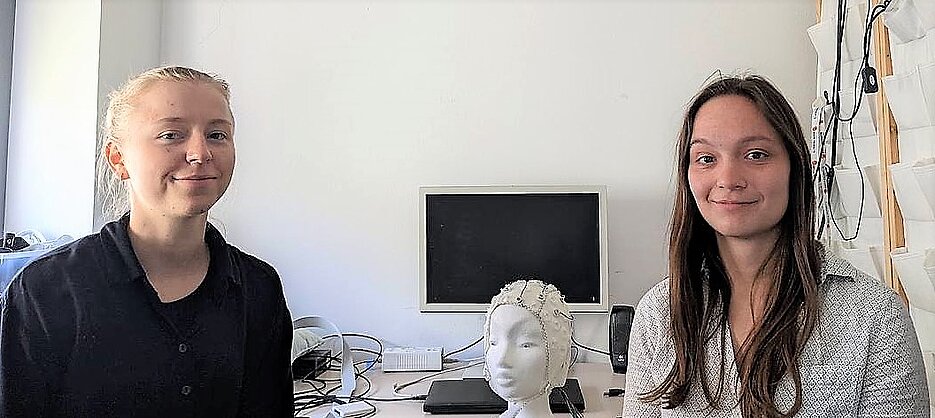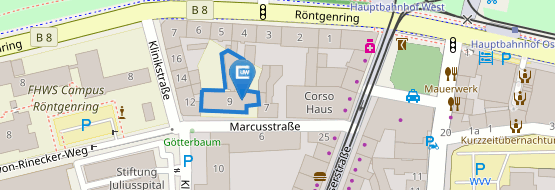Introducing the PhD Researchers: Eva Masson and Maria Pfeiffer (Project A2)
12.09.2022Project Area A deals with Circuit Switches for Approach and Avoidance. Project A2 under the supervision of Principal Investigator Prof. Kübler is about "Modulating oscillatory activity to reduce avoidance and increase approach behaviour in humans".
Thank you for agreeing to a short interview. Could you start by explaining your research area in more detail?
Eva:
"My project is focused on approach avoidance conflict behavior and neural correlates in healthy participants. I will use high-density EEG recordings as a tool to study the temporal pattern of brain activity when participants face a motivational conflict. Hopefully, this evidenced pattern will help Maria design her neurofeedback project. Since I am still designing a paradigm, I hope to create a pilot and start collecting data from healthy participants. I also plan to look at existing data already collected from a similar experimental paradigm."
Maria:
"I am working on a neurofeedback paradigm to manipulate approach-avoidance behavior. This means, I will try to teach my participants to modulate a specific neurophysiological correlate. The first step will be to establish the modulation on the physiological level and afterwards we can check if this influences the behavior."
Does the PhD meet your expectations? What has surprised you?
Eva:
"Since I recently joined back the academic world, I only knew what a PhD meant through student friends. Therefore, I knew it was a lot of work and learning opportunities, and I was not disappointed! To be honest, I had to adapt to this new life, because the academic world has its own rules. If you are planning to join a PhD and, like me, do not come this world, I would highly recommend getting in touch with potential colleagues or fellow students before your start date. I am so happy I got to meet amazing colleagues who made the transition way easier!"
Maria:
"This is difficult to answer - I honestly did not have a clear picture in mind of what to expect, since I heard and witnessed quite diverse experiences of doctoral students. But I can gladly say, that my experiences so far are only matching the good ones. Having heard a lot of "horror stories" of being "abandoned" and completely on your own during the PhD, I am a bit surprised but mostly thankful for the really great and supportive environment within my workgroup and also this RTG."
Where do you see challenges and hurdles for the near future?
Eva:
"Data collection can be tricky. I try to plan caveats as much as possible, but it is still part of the learning process."
Maria:
"Keeping focus! I struggle a bit with avoiding "rabbit holes", and sometimes lose myself in tiny details which are not even directly related or really important to the project. I guess this kind of curiosity is what drove me into research, but it's also what prevents me from progressing faster, as this is mostly quite time-consuming."
How did you find out about the RTG? Why did you decide to become part of the RTG?
Eva:
"There is a nice community exchanging information in the fieldtrip help mailing list (Fieldtrip is a toolbox for Matlab that is very well suited for EEG data analysis). Some day, Lea posted a job offer and that was the RTG! I wanted to improve my knowledge in experiment design and already collected EEG data for another project during my master thesis. This is why I applied."
Maria:
"I already wrote my master thesis in Prof. Küblers lab, that's where I also found out about the RTG. My decision was guided by several key factors, mainly the project description of A2b matched my interests far too well to let this opportunity pass, but I was also convinced that the structured program of the RTG will be a huge benefit."
Is Würzburg a good place for an optimal “PhD life”?
Eva:
"Würzburg is a really nice city. Without being directly directed to the PhD, it is still important to see if the city fits your lifestyle. Even though it is not big, there is always an opportunity to plan something interesting, especially in summer because there are multiple festivals.
As a foreigner, moving in can be challenging, especially if you do not speak German. Most of the events or exchanges, even inside of university, are in German. However, nearly everyone will make an effort when they realize you are left behind. Also, there are some opportunities to learn German, but I would recommend looking outside of university, as intensive language courses are not available for PhD students."



